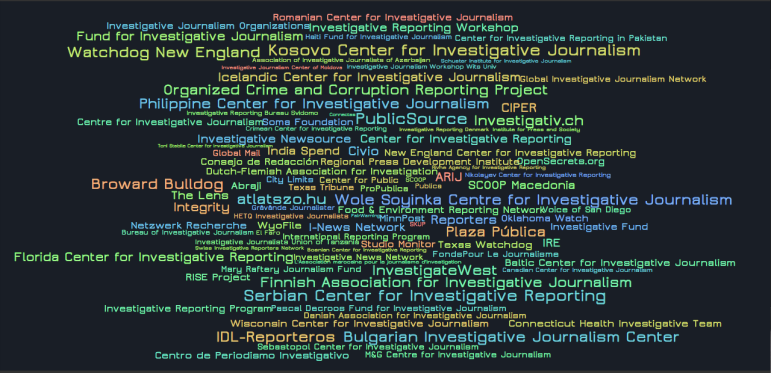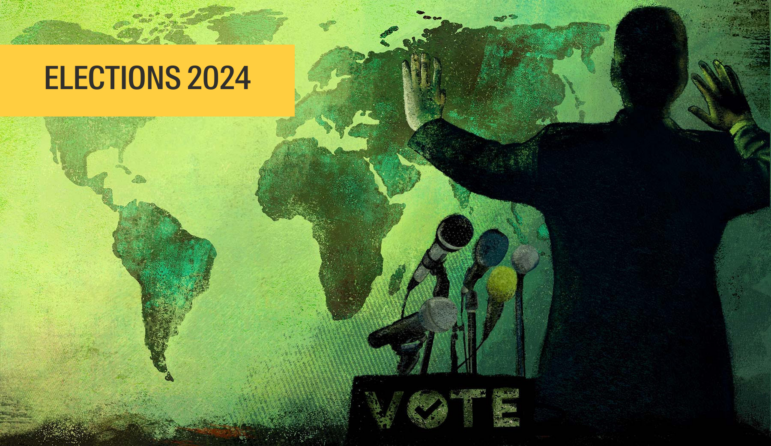

Illustration: Smaranda Tolosano for GIJN
Introduction to Investigative Journalism: Following the Money
Read this article in
Guide Resource
Guide: Introduction to Investigative Journalism
Chapter Guide Resource
Introduction to Investigative Journalism
Chapter Guide Resource
Introduction to Investigative Journalism: Interviewing Techniques for Beginners
Chapter Guide Resource
Introduction to Investigative Journalism: Following the Money
Chapter Guide Resource
Introduction to Investigative Journalism: Data Journalism
Chapter Guide Resource
Introduction to Investigative Journalism: Fact-Checking
Chapter Guide Resource
Introduction to Investigative Journalism: Digital Security
Chapter Guide Resource
Introduction to Investigative Journalism: Collaborations
Chapter Guide Resource
Introduction to Investigative Journalism: Editing: The Investigative Article
Following the money is a complex set of techniques that allow reporters to track the flow of money across the world, to uncover hidden assets and complex financial schemes, including money laundering and bribery. It also is vital for identifying who benefits from corruption and crime.
Novice journalists often feel like following money is so difficult that it’s impossible. The good news is: It’s not. There have never been more records available to journalists.
Why follow the money? Because it leads to where dirty money is ending up and where it came from. Financial schemes aren’t victimless crimes. The price is paid by regular people, who have to pay higher taxes or suffer from lost services because the rich have made off with the money.
The money trail connects corrupt politicians with criminals and with widespread wrongdoing that goes far beyond hidden ownership of villas at exclusive locations and luxury yachts. It reveals who is truly behind dodgy deals that should serve the public, but instead end up in pockets of criminals. And it can take reporters to the source of corruption, including illegal arms dealing, and drug trafficking. What are the main steps to follow the money successfully?
Before starting, learn the lingo — words such as agents, formation agents, intermediaries, officers, beneficial owners, UBOs (ultimate beneficial owners), or nominees.
Proxies serve a legitimate purpose in many situations, but in some situations — the ones in which we are interested — they may be individuals or companies that help individuals hide their identities as owners of assets. In some cases, the individuals in the role often don’t know they’re proxies. It can be a type of identity theft. There’s a shift in progress nowadays though, and many proxies knowingly become proxies — at a price.
Power of attorney is another important phrase to understand before digging into corruption. It’s the official representation of the company by a lawyer, or by a law office. They may be assisting in hiding the money and hiding the wealth.
Step 1: Profile the Person You Are Investigating
Following the money is all about names. The more names you get, the better your odds of finding information. Top officials will rarely hold companies in their own names. Organized crime figures will often hide behind lawyers. Corrupt business executives will often hire proxies to hide their tracks.
Start by looking at the broadest range of news sources possible, but keep in mind not to take those as facts. Make sure to check media archives in the country where the person of interest operates, as articles often disappear from websites, are lost as media organizations shut down, or important information predates the internet. Read everything that was written about the person you are investigating. Make a note of every name and any information you come across — it can be companies, associates, proxies, lawyers, family members, friends, enemies, even dates of birth, nannies, and home addresses. Journalists should never assume what they read in other media publications is absolutely proven. They need to report it themselves.
Create a spreadsheet in which to enter new information you uncover. Use this database as a starting point when searching online and offline registers and keep adding new names as you come across them. There are search engines, such as DuckDuckGo, which retain fewer traces of your searches than others, such as Google.
Step 2: Search All Available Online Databases
We live in a golden age when it comes to following money across borders. We have never had access to so many databases globally – not just individual country registers but also aggregated databases and leaks. We are always trying to get as many documents as possible about a person or company.
Online and offline public registries, such as company records, land ownerships, court records, lobby lists and registers can provide important information. First on a list of where to start searches are always local country company and corporate registers, then Opencorporates, Companies House, Open Ownership Register, and more. Local land registries and real estate records, as addresses can tell us a lot. Also we always check them in Google Maps. They can tell us if there are other companies at the same place, who their neighbors are, and more.
Online databases such as Sayari, Lexis-Nexis, and Orbis can provide relevant information, though they can be very costly. Sometimes they provide discounted prices for media organizations. Some universities, libraries or research institutes have access and journalists may be allowed to use them there.
We should never forget to broaden searches for companies or people countries beyond their home bases. Sometimes entities may have “sister” or “mother” companies in other countries. Information about additional companies could be listed in the local registries under shareholders or beneficial owners. Sometimes, companies may be registered under similar or the same names in other places and in offshore jurisdictions.
Learning relevant terms in the offshore world can help us understand where money is hidden. Many corrupt actors use agents, intermediaries, nominees, and lawyers to hide their wealth. The International Consortium of Investigative Journalists (ICIJ) created a list of the most common terms from the offshore world with short explanations.
Shifting money to offshore locations that may provide more favorable conditions, including tax avoidance, relaxed regulations, or asset protection is one way in which criminals may protect assets. But there are others, too, including purchasing art or antiques at inflated prices to disguise the origin of illegally obtained funds. Opening trusts which is legal in the United States as well as in offshore locations and buying property work toward the same end.
Politicians, oligarchs, and criminals are often not listed as owners of companies, assets, luxury cars, yachts or jets, listing them instead under other companies or individuals. Researching more complex ownership structures can be challenging, but investigative media organizations like ICIJ and OCCRP are providing additional support to journalists. It is possible to send a query to both organizations asking them to provide additional information about a person or a company. Both organizations have useful online databases for journalists. The Offshore Leaks database, for instance contains information on about 810,000 offshore companies, foundations and trusts from the Pandora Papers, Paradise Papers, Bahamas Leaks, Panama Papers and Offshore Leaks investigations and Aleph is a data platform that brings together a vast archive of current and historic databases, documents, leaks and investigations.
Even almost a decade after the Panama Papers were published, new stories still come out of the database. Keep searching this and similar databases, as not every story has been covered.
Anyone is welcome to browse Aleph, either anonymously or by creating a user account. If you are a professional journalist, you may apply to become a Friend of OCCRP, in order to gain wider access to Aleph’s data and materials.
It is important not to forget FOI — freedom of information — requests, which are the law in more than 100 countries. Using that information, reporters can find relevant information about public spending, financial company reports, government budget spending, and much more.
Today, social media also provides important information about financial cover-ups, especially when it comes to spouses, relatives, and friends who may be beneficial owners of businesses, protecting the identity of politicians and criminals.
Even in the online era, human sources and offline databases are also important for providing additional data. Offline databases, such as archives, land records and libraries are quite useful. In many countries, seeking information in person, even though an online version exists, usually makes a big difference.
Finally, don’t forget to look for public records in other countries outside the country where the suspect lives or operates. Use OCCRP’s ID, a global index of registries from 180 plus countries in one place.
Step 3: Analyze Information and Data
After gathering findings and data, it is necessary to analyze and organize the connected dots into an easy-to-read investigative story. Reporters are not working on “decoding” vast amounts of data alone — they are often aided by data journalists, developers, and tech staff, who help them follow the money.
One important place on which to concentrate is the company’s financial statements. Though they may seem intimidating at first sight, asking the right questions can lead you to great stories. For example, what assets does this company have and where did its money come from? Does it owe huge amounts of money to suppliers and to whom in particular? One time we discovered that a UK company paid a success fee to a company we later linked to the son-in-law of a president of another country.
Watch for companies with high receivables. That’s when a company has sold a lot of goods or services, but hasn’t collected payments. It may be poor financial management, but it could also mean the money is being stashed elsewhere, even out of the country.
The money may be moved to shell companies — entities with no real business operations or significant assets. Then the company to which the money was owed may take money back, in the form of a loan, from its connected shell, avoiding taxes, and never paying it back to the shell company.
Step 4: Always Work with Local Journalists
Money doesn’t recognize borders, and transactions are made all over the world. Journalists should work with colleagues from other countries — local reporters who often understand and know how to find additional information in their own countries, and may be able to add important local focus to the stories.
If you don’t know anyone from certain countries, professional journalists and their media organizations can be found in the list of partners of the OCCRP, GIJN, and ICIJ.
You’ll save time by working with local journalists, who may need just a few minutes to identify a database with the information you need. People like to help. Just reach out to them.
Step 5: Additional Databases
Court records can also be a great source for ‘follow the money’ investigations. After all, those business disputes won’t settle on their own. You should look, not just inside your own country, but also in well-known jurisdictions like the USA and UK. Pacer is an online database containing public records of court cases, including affidavits, evidence, and other records presented at court. More limited are UK court records. Bailli (British and Irish Legal Information Institute) has an easily searchable database of UK court verdicts.
If you are reporting about sanctions or want to trace the origin of goods, trade data will come in handy. To find answers about imports and exports, check for example ImportGenius and the UN Comtrade database. Finding a company or a person under sanctions is a story on its own. That is why we recommend the following databases to check: OFAC and Open Sanctions.
Offshore Alerts, another important resource, offers a great database of offshore and onshore courts. They “hunt for red flags in high-value international finance by monitoring offshore and onshore courts, regulatory actions, offering materials, and other sources – and email you summaries.”
Step 6: Think Outside the Box
For the Pandora Papers investigation, a major journalistic collaborative project that provided new insight into an illicit financial system that benefits the wealthy, journalists had to be creative.
The Pandora Papers revealed more than 1,600 works of art secretly traded through tax havens. Art is often used to hide money and put it in official streams. ICIJ, Finance Uncovered, and the Washington Post published an investigation examining museums’ Asian collections that included Cambodian antiquities that passed through the hands of a well-known art collector. Reporters found dozens of pieces of Khmer arts, by using public sources like books, museums websites, gallery catalogs, art blogs and with experts help, that were owned or brokered by the collector. Journalists were checking dimensions and other details so they could confirm the art pieces.
Following the money is a powerful skill to have, and the reports it generates have had a significant impact. Sometimes the result is new legislation to prevent money laundering. Sometimes politicians lose their jobs because of the investigative stories that reveal their hidden wealth. But the most important product of these stories is to serve the public interest — by shining light on places that nobody has looked before.
 Miranda Patrucic joined OCCRP in 2006 and was promoted to editor-in-chief in 2023. She oversees editorial operations for OCCRP’s global newsroom, including 50+ editors across six continents, and the production of OCCRP’s investigations and content. Patrucic was one of the first employees at OCCRP, beginning in Sarajevo as the organization’s first fact-checker before moving on to become a researcher, reporter, trainer, and editor. She oversaw work in the Balkans and became known for her reporting about the authoritarian regime in Azerbaijan after her friend and investigative reporter Khadija Ismayilova was sentenced to jail there in 2015.
Miranda Patrucic joined OCCRP in 2006 and was promoted to editor-in-chief in 2023. She oversees editorial operations for OCCRP’s global newsroom, including 50+ editors across six continents, and the production of OCCRP’s investigations and content. Patrucic was one of the first employees at OCCRP, beginning in Sarajevo as the organization’s first fact-checker before moving on to become a researcher, reporter, trainer, and editor. She oversaw work in the Balkans and became known for her reporting about the authoritarian regime in Azerbaijan after her friend and investigative reporter Khadija Ismayilova was sentenced to jail there in 2015.
 Jelena Cosic is ICIJ’s training manager, Eastern European partnership coordinator, and data reporter. For the past five years, she has worked on ICIJ’s global projects like Pandora Papers, Cyprus Confidential, Fincen Files, Deforestation Inc, and more. Jelena has trained over 2,000 investigative reporters all over the world. She has received several investigative journalism awards, including a Certificate of Excellence, Global Shining Light Award; an EU Investigative Journalism Award in the Western Balkans and Turkey; and several awards during her work with ICIJ, Tom Renner Award, finalists for Pulitzer Prize and Nobel Peace Prize nomination.
Jelena Cosic is ICIJ’s training manager, Eastern European partnership coordinator, and data reporter. For the past five years, she has worked on ICIJ’s global projects like Pandora Papers, Cyprus Confidential, Fincen Files, Deforestation Inc, and more. Jelena has trained over 2,000 investigative reporters all over the world. She has received several investigative journalism awards, including a Certificate of Excellence, Global Shining Light Award; an EU Investigative Journalism Award in the Western Balkans and Turkey; and several awards during her work with ICIJ, Tom Renner Award, finalists for Pulitzer Prize and Nobel Peace Prize nomination.



















